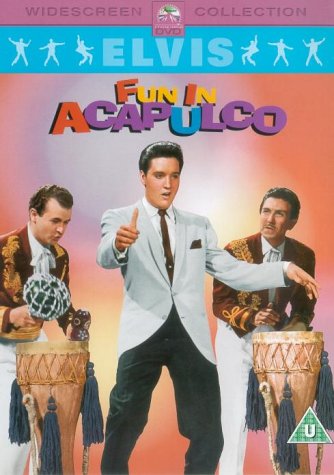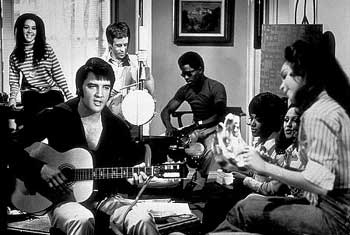I consider myself to be a bona fide Elvis person. I’m utterly fascinated by his persona and believe him to have been the greatest performer of the 20th century. If we’re referring to his live shows of the 50s and 60s, I’m sure many would be of the same opinion, but to some degree I’d also extend this to his film work. Granted, most of the projects he was involved with were cheesy B-movies, but he always managed to elevate them to a category of their own, the “Elvis flick”. These are not masterpieces, but they always pack pretty girls, goofy charm and cheerful musical numbers, which is more than what you get from most pictures.
After getting his start in the 1956 western “Love Me Tender”, Presley mostly focused on recording, touring and doing his military service in Germany. Then came the 1960s, and Elvis practically became a full time Hollywood star, doing 27 movies in that decade alone! This period of his career concluded with “Change of Habit” in 1969. His recording career having been revived by his 68 Comeback Special, Presley made that last movie then spent the last years of his life doing countless sold-out concerts.
“Change of Habit”, now available on DVD from Universal Home Entertainment, is an enjoyable film, even though Elvis is just in a supporting role and only has a few musical numbers. The lead here is actually Mary Tyler Moore, who was between her gig on the “Dick Van Dyke Show” and her classic “Mary Tyler Moore Show”. She plays Sister Michelle, one of three nuns who leave the covent and their habits to go help people incognito in an inner-city clinic on Washington Street. They get a makeover (!) and arrive only to find Presley bringing down the house by leading a grooving bedroom party into a rollicking rendition of “Rubberneckin”!
It turns out that this sexy, energetic musician happens to also be Dr. John Carpenter, a caring M.D. who devoted his life to helping the disadvantaged. That’s right, Elvis is playing an inner-city doctor, and he’s about to fall in love with a street-garbed nun! “Change of Habit” wants to be a “message” picture about coming together as a community that doesn’t shy away from tough issues like racism, sexual abuse, drug addiction and crime, but you have to admit that the execution is silly. In this “ghetto”, diplomacy is supposed to “start and end at the point of a switchblade knife”, but what we’re seeing is a lively Technicolor hood waiting to break into a lively street fiesta, despite the cartoonish threat posed by local gangster “the Banker”.
And while Michelle and Elvis do treat a patient who’s been using “H” at some point, most of the time they’re doing little things like helping a Latino hooligan with his stuttering or conducting a bizarre “rage reduction” session with a little girl to cure her autism (don’t ask). He also finds time to try wooing Michelle by painting her apartment, teaching her to play guitar or playing touch football, unaware that she made vows to another man, God! Who will she choose, Jesus or the King?
Still, “Change of Habit” is a well-meaning attempt to channel the spirit of the 60s counterculture, and you must applaud the way it positively portrays women’s lib or the Black Panthers. The idea of a struggle in the Church between tradition and the introduction of new methods more in synch with the new generation is interesting even though it’s only superficially explored. This isn’t quite the breezy Elvis flick you’d expect, but Presley is compelling even when playing it straight and he does get to punch a few thugs and belt out a few songs. With its grooving Motown beat, the aforementioned “Rubberneckin” is one of Elvis’ best movie numbers, his performance of “Have a Happy” on a horses carousel is amusing and the quick-cutting between Michelle alternately looking at statues of Jesus and at Elvis singing “Let us Pray” during a church service provides a nicely ambiguous ending for the film.

BONUS: FUN IN ACAPULCO!!!
Note: You’ll notice that the review below shamelessly rips off the one above. It’s because I originally wrote it for another website and I’m a lazy, lazy man. Hence the regurgitation.
In one of the deleted scenes found on the Pulp Fiction DVD, Mia asks Vincent Vega a series of questions sorting out his “types”, pop culture-wise, like “If you were Archie, who would you (do) first, Betty or Veronica?” The big one, of course, is The Beatles or Elvis? “Now Beatles people can like Elvis. And Elvis people can like the Beatles. But nobody likes them both equally. Somewhere you have to make a choice.” Personally, I adore the Beatles and consider them to be the most brilliant artists of the 20th century, yet Elvis still one-ups them for one simple reason: he’s Elvis frickin’ Presley. You can’t beat that!
Elvis’ body of work might be mightily uneven and he became grotesque in his later years, but I can’t look at 1956-1968 Presley and call myself anything other than an Elvis person. There was something infinitely fascinating in Elvis during his prime, with his exceptional good looks, his overflowing charisma and the pure soul he put into every performance. If we’re referring to his live shows of the 1950s and ‘60s, I’m sure many would be of the same opinion as me, but to some degree I’d also extend this to his film work. Granted, most of the films he was involved with were cheesy B-movies, but he always managed to elevate them to a category of their own, the “Elvis flick”. These are not masterpieces, but they always pack in lots of pretty girls, goofy charm and cheerful musical numbers, which is more than what you get from most pictures.
After getting his start in the 1956 western Love Me Tender, Presley mostly focused on recording, touring and doing his military service in Germany. Then came the 1960s, and Elvis practically became a full time Hollywood star, doing 27 movies in the decade. This period of his career concluded with Change of Habit in 1969. His recording career having been revived by his 1968 Comeback Special, Presley made that last movie then spent the last years of his life doing countless sold-out concerts.
In 1963 came Fun in Acapulco, which is everything you expect an Elvis flick to be. The typically thin storyline has Elvis as Mike, a circus acrobat now suffering from a fear of heights after a deadly trapeze accident. He finds himself south of the U.S. border working first as a boat hand then as a singer in hotel lounges and restaurants after he’s discovered by a 10-year-old shoeshine boy (Larry Domasin) who decides to become his agent! This leads to many enjoyable Latin-flavoured tunes where Presley is backed by a Mariachi band. These include songs such as “Marguerita”, “Bossa Nova Baby” (which has Elvis hitting the keyboards and bongos) and “Guadalajara” (sung by Presley in Spanish) as well as a few silly ditties performed by Elvis on a bicycle or in cars (“There’s no room to rhumba in a sports car”!).
Between songs, Mike manages to seduce both lady bullfighter Dolores Gomez (Elsa Cardenas) and the hotel’s social manager Marguerita Dauphin (the ravishing Ursula Andress), which leads to much hammy dialogue and hammier acting. Still, writer Allan Weiss (who also contributed to five other Elvis flicks) and director Richard Thorpe (who directed Presley’s best film, Jailhouse Rock) keep things light and bright and Elvis fans should be delighted. Fun in Acapulco is a pleasant diversion full of sun, music and beautiful girls.

